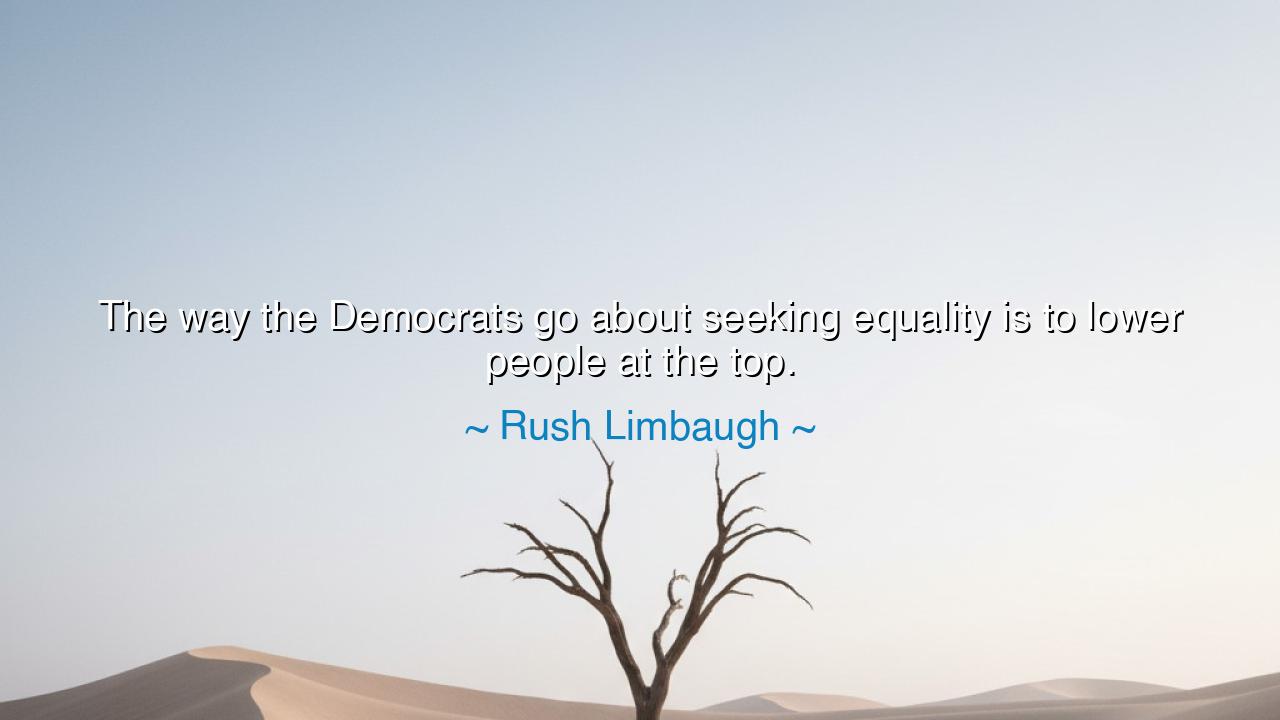
The way the Democrats go about seeking equality is to lower






Hear now the words of Rush Limbaugh, a voice both praised and reviled, who thundered against the politics of his age: “The way the Democrats go about seeking equality is to lower people at the top.” In this saying lies not only criticism but also a warning. He declares that the pursuit of equality, when handled wrongly, is not the lifting up of the weak but the tearing down of the strong. It is a vision of fairness that does not inspire greatness, but restrains it, demanding that no one rise too high lest others feel left behind.
The meaning of his words is sharp and provocative. Limbaugh argues that certain visions of social equality can become corrupted, no longer about expanding opportunity but about enforcing sameness. To him, when policies tax heavily, regulate tightly, or redistribute wealth too aggressively, they punish success instead of cultivating it. This, he believes, weakens the whole society, for greatness is diminished when its fruits are stripped away rather than multiplied. His words, though partisan, reflect an ancient debate: is equality the leveling of heights, or the lifting of those in the valleys?
The origin of this struggle can be found throughout history. Consider the French Revolution, when cries for liberty and equality began with noble aims. Yet soon the guillotine became the tool of leveling, cutting down not only tyrants but also thinkers, innovators, and visionaries. In their fury to destroy privilege, the revolutionaries often destroyed excellence, and what was left was not equality, but terror. Limbaugh’s warning resonates with such history: that in the zeal for equality, societies may sometimes mistake destruction for justice.
Yet there is also a counterpoint in history. Look to Franklin D. Roosevelt and the New Deal. Here, too, taxes were levied, wealth redistributed, and government power expanded. Yet the aim was not to cut down the successful, but to prevent collapse and to lift millions from poverty. Out of those reforms grew not weakness but strength, as the United States emerged more stable, its middle class flourishing. Here we see that equality can be pursued not by lowering the top, but by raising the bottom. Thus, Limbaugh’s caution is real, but not the final word.
His statement also reveals a deeper truth about human nature. It is easy for the envious to call for leveling, easier still for leaders to promise it. But the wise know that envy cannot build, it can only destroy. True justice seeks to expand opportunity so that more may climb, not to chain those already at the summit. For a society that crushes its best in the name of fairness soon finds itself poorer, weaker, and bereft of vision. The real challenge is to find a way where prosperity inspires, where success is shared, and where the ladder of ascent is open to all.
The lesson, then, is this: beware the false equality that destroys greatness in the name of fairness. Strive instead for the true equality that multiplies opportunity, that opens doors, that equips the weak to rise without dragging down the strong. Let leaders pursue policies that protect the vulnerable without punishing achievement. Let citizens honor success, not resent it, and seek to imitate diligence rather than condemn it.
So, children of tomorrow, learn this wisdom. If you would build a just society, do not envy those at the top, nor scorn those at the bottom. Instead, build bridges between them. Encourage the strong to lift others with their strength, and equip the weak to climb by their own effort. Seek equality not through destruction, but through creation. For only then will your land be filled with both fairness and greatness, and your people will walk not in envy or fear, but in hope and shared prosperity.






AAdministratorAdministrator
Welcome, honored guests. Please leave a comment, we will respond soon